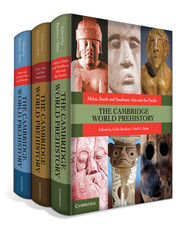Book contents
- Frontmatter
- Contents Summary for Volumes 1, 2 and 3
- Contents
- Volume 1 Maps
- Volume 2 Maps
- Volume 3 Maps
- About the Contributors
- Volume 1
- Volume 2
- Volume 3
- VII. Western and Central Asia
- VIII. Europe and the Mediterranean
- 3.17 Early Palaeolithic Europe
- 3.18 Europe and the Mediterranean: DNA
- 3.19 The Upper Palaeolithic of Europe
- 3.20 Upper Palaeolithic Imagery
- 3.21 Early Food Production in Southeastern Europe
- 3.22 Early Food Production in Southwestern Europe
- 3.23 Hunters, Fishers and Farmers of Northern Europe, 9000–3000 bce
- 3.24 The Aegean
- 3.25 Post-Neolithic Western Europe
- 3.26 The Later Prehistory of Central and Northern Europe
- 3.27 The Post-Neolithic of Eastern Europe
- 3.28 The Classical World
- 3.29 Europe and the Mediterranean: Languages
- Index
- References
3.28 - The Classical World
from VIII. - Europe and the Mediterranean
Published online by Cambridge University Press: 05 August 2014
- Frontmatter
- Contents Summary for Volumes 1, 2 and 3
- Contents
- Volume 1 Maps
- Volume 2 Maps
- Volume 3 Maps
- About the Contributors
- Volume 1
- Volume 2
- Volume 3
- VII. Western and Central Asia
- VIII. Europe and the Mediterranean
- 3.17 Early Palaeolithic Europe
- 3.18 Europe and the Mediterranean: DNA
- 3.19 The Upper Palaeolithic of Europe
- 3.20 Upper Palaeolithic Imagery
- 3.21 Early Food Production in Southeastern Europe
- 3.22 Early Food Production in Southwestern Europe
- 3.23 Hunters, Fishers and Farmers of Northern Europe, 9000–3000 bce
- 3.24 The Aegean
- 3.25 Post-Neolithic Western Europe
- 3.26 The Later Prehistory of Central and Northern Europe
- 3.27 The Post-Neolithic of Eastern Europe
- 3.28 The Classical World
- 3.29 Europe and the Mediterranean: Languages
- Index
- References
Summary
This chapter is concerned with a geographical area that at first extended over the coastal zones of the central and eastern Mediterranean and the Black Sea, then in its later stages to a much broader territorial swathe, intermittently reaching from the Atlantic and the North Sea to the Persian Gulf and the Indus Valley. The cultures inhabiting this area do not usually feature in narratives of world prehistory, for two main reasons. There is, first, the presence of the ancient written sources, seen as profoundly affecting, even distorting or re-directing, the archaeology of Greece and Rome. But a truer analogy here would be with the ethnographic evidence often cited by the prehistorian: as there, so here a statement in an ancient text can justifiably be used to give added conviction to a conclusion based on the material evidence, but is better not taken as the starting point for such a case. Secondly, there is the purely operational factor that many Classical archaeologists, especially those working on ancient Greece, do in practice spend much of their time in object-centred activities that simply have no counterpart in prehistoric archaeology. This is in part because the archaeology of Greece and Rome disposes of a database of enormous size, built up over centuries of discovery and minutely studied by later generations.
Chronologically, we can trace the roots of Classical culture back to the 11th century bce, when the archaeology of the Greek Peninsula and islands begins to display a definitive break with the earlier Minoan and Mycenaean cultures of the Aegean Bronze Age. This break is not brought about by the appearance of fresh and reliable written sources: on the contrary, for a long time the documentary evidence is even scarcer than in the final Bronze Age. It is a purely archaeological distinction, drawn in terms of apparent material and cultural losses, increased regionalism and less frequent external communications.
- Type
- Chapter
- Information
- The Cambridge World Prehistory , pp. 1958 - 1976Publisher: Cambridge University PressPrint publication year: 2014



